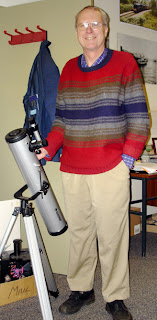Particle Astrophysics: 5 Needed Breakthroughs
-- James Hough
 James Hough [Photo Courtesy: Institute for Gravitational Research, University of Glasgow]
James Hough [Photo Courtesy: Institute for Gravitational Research, University of Glasgow][Today's guest in our ongoing feature '5-Breakthroughs' is James Hough, Director of the Institute for Gravitational Research, and Professor of Experimental Physics in the Department of Physics and Astronomy, University of Glasgow.
Prof. Hough is also the Chairperson of Gravitational Wave International Committee (GWIC) which was formed in 1997 by the directors and representatives of projects and research groups around the world whose research is aimed at the detection of gravitational radiation. The purpose of GWIC is to encourage coordination of research and development across the groups and collaboration in the scheduling of detector operation and data analysis. GWIC also advises on the location, timing and programme of the Edoardo Amaldi Conferences on Gravitational Waves which are held every 2 years, and presents a prize for the best Ph.D. thesis submitted each year (for details, visit 'GWIC Thesis Prize')
His current research interests are in the investigation of materials for test masses and mirror coatings, and in the development of suspension systems of ultra-low mechanical loss towards
a) second generation gravitational wave detectors, in particular Advanced LIGO – upgrade to the US LIGO gravitational wave detector systems (Advanced LIGO is now approved by the National Science Board in the USA and supported by a significant capital contribution from PPARC in the UK and MPG in Germany).
b) third generation long baseline gravitational wave detectors, in particular the proposed Einstein Telescope in Europe, and towards LISA the ESA/NASA space borne gravitational wave detector.
Prof. Hough is Fellow of the Royal Society of London (2003), the American Physical Society (2001), the Institute of Physics (1993) and the Royal Society of Edinburgh (1991). He received Duddell Prize and Medal of the Institute of Physics in 2004 and Max Planck Research Prize in 2001.
It's our pleasure to present the 5 most important breakthroughs that Prof. Hough would like to see in the field of Particle Astrophysics.
-- 2Physics.com Team]
1) The direct detection of gravitational radiation
It is very important to make a direct detection to verify one of the few unproven predictions of Einstein's General Relativity and even more importantly to lead to the birth of a new astronomy. Gravitational wave astronomy will let us look into the hearts of some of the most violent events in the Universe.
2) The quantisation of Gravity
The challenge of developing a quantum theory of gravity and unifying gravity with the other fundamental forces in nature will undoubtedly lead to new discoveries about our Universe
3) The understanding of Dark Energy
Dark Energy - the mysterious reason for our Universe expanding anomalously - is not understood. Solving this enigma may help with understanding quantum gravity and will certainly give us a new perspective on fundamental interactions.
4) The successful launching of LISA, the space-borne gravitational wave detector
LISA will allow the study of the birth and interaction of massive black holes in the Universe in a way that cannot be achieved by any other mission.
5) The identification of dark matter
Observations suggest that there is much more matter in the Universe than we observe by standard means. Finding out the nature of the unseen 'dark' matter is a challenging problem for experimental physicists.
Labels: 5-Breakthroughs, Dark Energy, Dark Matter, Gravitation, Gravitational Waves

0 Comments:
Post a Comment